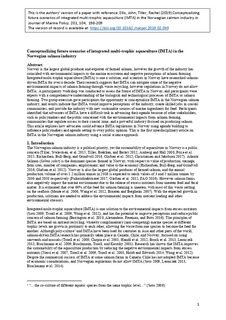| dc.contributor.author | Ellis, John H | |
| dc.contributor.author | Tiller, Rachel | |
| dc.date.accessioned | 2019-08-27T06:53:20Z | |
| dc.date.available | 2019-08-27T06:53:20Z | |
| dc.date.created | 2019-03-20T16:54:09Z | |
| dc.date.issued | 2019-06 | |
| dc.identifier.citation | Marine Policy. 2019, 104 198-209. | nb_NO |
| dc.identifier.issn | 0308-597X | |
| dc.identifier.uri | http://hdl.handle.net/11250/2611070 | |
| dc.description.abstract | Norway is the largest global producer and exporter of farmed salmon, however the growth of the industry has coincided with environmental impacts to the marine ecosystem and negative perceptions of salmon farming. Integrated multi-trophic aquaculture (IMTA) is one solution, and scientists in Norway have researched salmon-driven IMTA for over a decade. Their research suggests that IMTA can mitigate some of the negative environmental impacts of salmon farming through waste recycling, however regulations in Norway do not allow IMTA. A participatory workshop was conducted to assess the future of IMTA in Norway, and participants were experts with a comprehensive understanding of the biological and technological processes of IMTA or salmon farming. Two group exercises gave participants the opportunity to conceptualize IMTA in the Norwegian salmon industry, and results indicate that IMTA would improve perceptions of the industry, create skilled jobs in coastal communities, and provide the industry with new sustainable sources of marine ingredients for feed. Participants identified that advocates of IMTA have a difficult task in advancing their agenda because of other stakeholders, such as policymakers and the public concerned with the environmental impacts from salmon farming, communities that regulate access to their coastal zone, and a powerful industry focused on producing salmon. This article explores how advocates could advance IMTA regulations in Norway using agenda building to influence policymakers and agenda setting to sway public opinion. This is the first interdisciplinary article on IMTA in the Norwegian salmon industry using a social science approach. | nb_NO |
| dc.language.iso | eng | nb_NO |
| dc.rights | Attribution-NonCommercial-NoDerivatives 4.0 Internasjonal | * |
| dc.rights.uri | http://creativecommons.org/licenses/by-nc-nd/4.0/deed.no | * |
| dc.title | Conceptualizing future scenarios of integrated multi-trophic aquaculture (IMTA) in the Norwegian salmon industry | nb_NO |
| dc.type | Journal article | nb_NO |
| dc.type | Peer reviewed | nb_NO |
| dc.description.version | acceptedVersion | nb_NO |
| dc.source.pagenumber | 198-209 | nb_NO |
| dc.source.volume | 104 | nb_NO |
| dc.source.journal | Marine Policy | nb_NO |
| dc.identifier.doi | 10.1016/j.marpol.2019.02.049 | |
| dc.identifier.cristin | 1686476 | |
| dc.relation.project | Norges forskningsråd: 216201 | nb_NO |
| cristin.unitcode | 7566,2,0,0 | |
| cristin.unitname | Sjømatteknologi | |
| cristin.ispublished | true | |
| cristin.fulltext | postprint | |
| cristin.qualitycode | 1 | |

